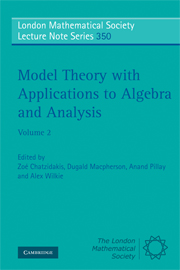Book contents
- Frontmatter
- Contents
- Preface
- Contributors
- Conjugacy in groups of finite Morley rank
- Permutation groups of finite Morley rank
- A survey of asymptotic classes and measurable structures
- Counting and dimensions
- A survey on groups definable in o-minimal structures
- Decision problems in Algebra and analogues of Hilbert's tenth problem
- Hilbert's Tenth Problem for function fields of characteristic zero
- First-order characterization of function field invariants over large fields
- Nonnegative solvability of linear equations in ordered Abelian groups
- Model theory for metric structures
A survey on groups definable in o-minimal structures
Published online by Cambridge University Press: 04 August 2010
- Frontmatter
- Contents
- Preface
- Contributors
- Conjugacy in groups of finite Morley rank
- Permutation groups of finite Morley rank
- A survey of asymptotic classes and measurable structures
- Counting and dimensions
- A survey on groups definable in o-minimal structures
- Decision problems in Algebra and analogues of Hilbert's tenth problem
- Hilbert's Tenth Problem for function fields of characteristic zero
- First-order characterization of function field invariants over large fields
- Nonnegative solvability of linear equations in ordered Abelian groups
- Model theory for metric structures
Summary
Introduction
Groups definable in o-minimal structures have been studied for the last twenty years. The starting point of all the development is Pillay's theorem that a definable group is a definable group manifold (see Section 2). This implies that when the group has the order type of the reals, we have a real Lie group. The main lines of research in the subject so far have been the following:
(1) Interpretability, motivated by an o-minimal version of Cherlin's conjecture on groups of finite Morley rank (see Sections 4 and 3).
(2) The study of the Euler characteristic and the torsion, motivated by a question of Y. Peterzil and C. Steinhorn and results of A. Strzebonski (see Sections 6 and 5).
(3) Pillay's conjectures (see Sections 8 and 7).
On interpretability, we have a clear view, with final results in Theorems 4.1 and 4.3 below. Lines of research (2) and (3) can be seen as a way of comparing definable groups with real Lie groups (see Section 2). The best results on the Euler characteristic are those of Theorems 6.3 and 6.5. The study of the torsion begins the study of the algebraic properties of definable groups, and the best result about the algebraic structure of the torsion subgroups is Theorem 5.9. On the other hand, the cases in which Pillay's conjectures are proved are stated in Theorems 8.3 and 8.8.
- Type
- Chapter
- Information
- Model Theory with Applications to Algebra and Analysis , pp. 177 - 206Publisher: Cambridge University PressPrint publication year: 2008
- 15
- Cited by



